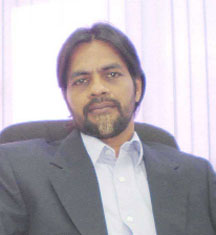Chief Executive Officer of the Guyana Telephone & Telegraph Company (GT&T) Yog Mahadeo said he was amused that his Digicel counterpart Gregory Dean was commenting on the profits being made by GT&T’s operations.
Reacting sharply last week to a comment attributed to Dean in an article published in the January 11 issue of the Stabroek News headlined ‘GT&T’s monopoly extended until law passed’ Mahadeo said that while Digicel appeared preoccupied with GT&T’s revenues “no one knows exactly how much Digicel is making in Guyana because the company won’t report its local financial results.”

Dean was quoted as saying in the article: You see the report every quarter from GT&T and you see what they declare in terms of the international markets. They’re making three to four billion dollars every quarter so… it gives you an idea of the scale involved in terms of the international markets.” He was referring to the profits being made by GT&T as a result of its international data traffic monopoly. Dean was speaking at Digicel’s year-end press briefing.
Mahadeo said too that he found it “amusing” that Dean was “complaining that his company was not making as much money off the people of Guyana as he would like.” Just a few months ago, the company was bragging about achieving $1.75 billion from its Caribbean operations.
Digicel has been sustained in its calls for an end to the GT&T monopoly and recently both Deane and Mahadeo publicly welcomed the advent of the draft legislation that heralds that first significant step in the liberalization of the country’s telecommunications sector.
In his comments on Dean’s remarks about the revenues accruing to GT&T from its overseas operations Mahadeo said the likelihood was that Digicel was itself doing quite well “in part because they enjoy a substantial wholesale discount on international calls courtesy of GT&T and do not pay appreciable if any local taxes.”

Mahadeo also asserted that (Digicel) rides “GT&T’S extensive landline network to complete Digicel mobile calls; and as the PUC just stated regarding Digicel’s refusal to agree to a new agreement to connect the GT&T and Digicel networks, Digicel has not been paying for services received from the company GT&T, but in the interest of the consumers, GT&T continued to offer the services pending the new agreement.”
According to Mahadeo while Digicel’s profits are sent overseas, “GT&T pays tremendous taxes and invests heavily in new infrastructure and better service… the company is responsible for a ten-fold increase in fixed line service, their new deep-sea cable is expanding the availability of reliable and affordable high-speed internet, and they’re working to offer wireless service to make fast mobile data a reality,” Mahadeo added.
The exchange between the heads of the two rival companies comes just weeks after the appearance of the first draft of the liberalization legislation. Up until now both sides have avoided any public comment that might provide the appearance of a war of words ahead of the eventual passage of the legislation to end GT&T’s monopoly. But a spokesman for the telecommunications sector told Stabroek Business on Wednesday that after this initial exchange “it would be surprising if more does not get said before GT&T’s monopoly comes to an end.” Just over a week ago, President Bharrat Jagdeo, who has been an aggressive advocate of an end to the monopoly, announced that it would be extended beyond its 20-year period and will now last until the new legislation is enacted.




